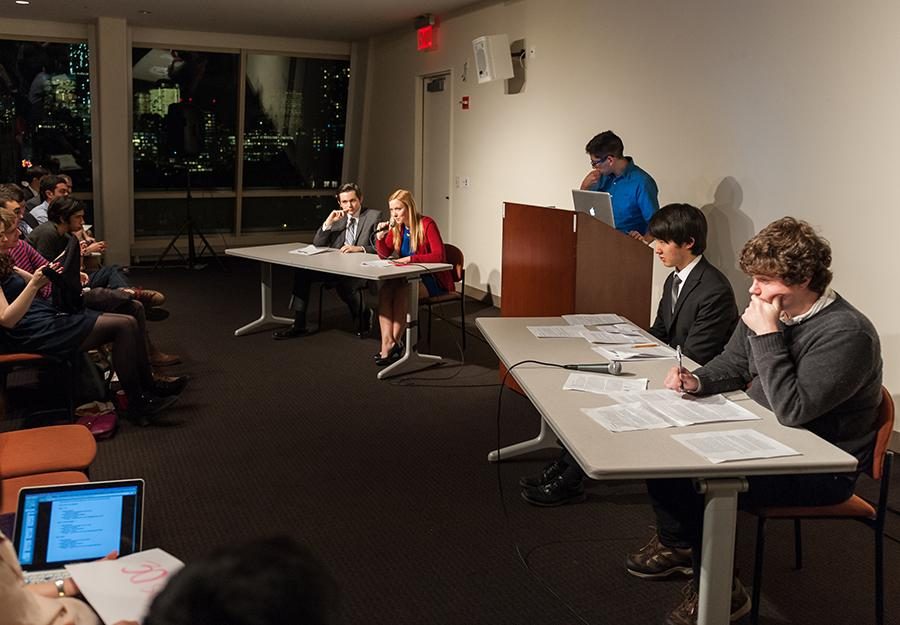Students gather to debate key issues
Megan Powers, Vice President of the NYU College Republicans, second from left, rebuts the stance taken on ISIL by her Democratic counterpart.
November 4, 2014
The Ebola epidemic, the threat of ISIS and income inequality were the main topics driving the debate between representatives from NYU’s College Libertarians, College Republicans, College Democrats and the International Socialist Organization at NYU on Nov. 3 at the Kimmel Center for University Life.
Audience members guided the discussion with questions directed at the student speakers. The debate was moderated by the NYU Politics Society.
John Martin, CAS junior and a speaker for the College Libertarians, answered a question asking how the United States should address the threat of ISIS. He argued that the United States should not be intervening in Iraq.
“I don’t think it’s our position to infringe upon any Iraqi policy,” Martin said. “It’s their country, not ours, we are the United States, not Iraq, so I can’t support any American taxpayer dollars going towards funding any Iraqi programs. I see no need for it.”
CAS senior Megan Powers, the speaker for the College Republicans, argued the opposite.
“If we allow ISIS to continue to take over areas that it is interested in, that is appeasement, that is what happened in World War II, and we can’t just allow them to take whatever they want,” Powers said. “We need to go in there, put boots on the ground and solve the conflict.”
Shifting to income inequality, doctoral student and representative for ISO Paul Heideman discussed metrics that indicated the median U.S. household income has dropped, while the top 1 percent of the population has increased its income.
“Economic inequality in the scale we have it in the United States is actually corrosive of democracy itself,” Heideman said.
CAS senior Bennett Hampilos, who represented the College Republicans, compared income inequality to graded taxation.
“We’ve heard about the rich owning a disproportionate share of the wealth in this country, but why isn’t anyone talking about the disproportionate share of taxes they have contributed?” Hampilos said.
College Democrat and CAS junior Jack Sterne said the United States should address the Ebola crisis by building health care infrastructure in West Africa, allowing healthcare workers to travel to West Africa and not placing restrictions on travelers from the affected region.
“In the end, there is one main thing the U.S. can do: keep calm,” Sterne said.
Stern freshman Abigail Lyall, who represented the College Libertarians, said while their organization usually protests infringement on individual liberties, they think some preventative action should be taken on the issue of Ebola.
“Normally, walking around with a deadly virus on one’s body that is threatening to the common epidemic is equivalent to biological terrorism,” Lyall said. “Those who show symptoms of Ebola should be quarantined either in a hospital or their own home until they no longer show signs of the disease.”
Nisha Bolsey, a CUNY senior and ISO member, criticized the government’s response to the Ebola crisis.
“I think we need to be clear that it’s not a force for humanitarian intervention, it’s a way, a foot in the door to get the military into this country and spending money on that instead of where it has to be spent on: healthcare,” Bolsey said.
A version of this article appeared in the Tuesday, Nov. 4 print edition. Email Marita Vlachou at [email protected].


























































































































































